Back in 2012 when I regained my interest in Japanese RPGs, I eventually discovered the Atelier games, which focuses more on item crafting rather than saving the world. While I have played all the games from the Arland trilogyand enjoyed them, Ayesha is the first game in the Dusk trilogy, which overhauled the synthesizing and battling systems while giving a slightly darker story. I choose not to play this game at first for the fact that Tecmo-Koei thought it was a good idea to remove the Japanese voices from the localized release.
At first, I thought of getting a Japanese copy. However, they eventually announced a Vita version several months later. Therefore, I waited to get that instead. With that, here are my initial thoughts of the game after playing for 30 hours. (Image Source)
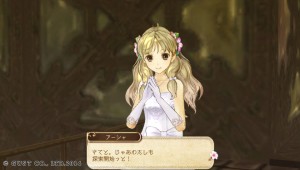
Taking a first glimpse of the graphics, the Dusk series has tons of graphical improvements over the Arland trilogy, especially the Plus versions. The graphics in the Ayesha Plus looks just as good as the Playstation 3 version with no texture downgrades. Besides Atelier Escha and Logy, which I played first before this game, I admit that I prefer the graphics of the Dusk series because it looks more appealing and this game is no exception. All the scenes are live action opposed to being sprites in the previous trilogy.
Of course, there are some initial downsides to keeping the same graphics quality. While the inconsistent frame rate will always be there along with inconsistent lip synching (which got fixed in Escha and Logy), the ability to change music has been removed unless you download the BGM Pack (which is free), which takes over 4 GB. While I don’t mind, it’s kind of a bummer if you have a 4 or 8 GB Vita Memory card considering how expensive they are.
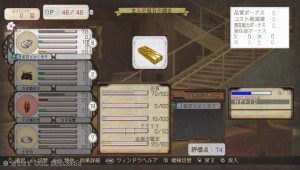
On the other hand, the Alchemy system was overhauled. In the Dusk games, items now have fixed effects, quality and elemental levels. What items you choose will determine the characteristics and effects of the item. Of course, you need to keep track of the CP, which is dependent on the mix level. If it runs out, you lose the effects of that particular item. Also, skills is a new addition that got expanded in Escha and Logy, which allows you to use some CP to make it easier to get the desired effects for an item you are making.
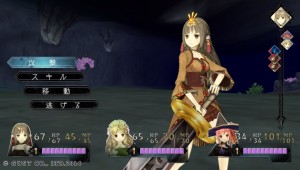
In addition, the battle system received some noticeable additions. Now, you can move your character to different parts of the field, thus allowing you to perform a back attack to deal more damage. While the assists are not shared like in New Rorona or Escha and Logy, you have access to more assist abilities and of course, Ayesha can protect her party members if you choose. However, she does not have skills, thus her MP is reserved for items that require it since its not used for alchemy.
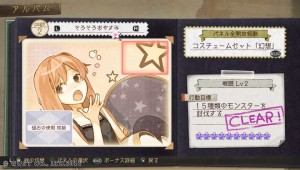
Unlike the Arland trilogy and Escha and Logy, you can pretty much do anything in Ayesha Plus for the fact that there is no set time limit besides the three years. This means that as long you find Nio before the three years are up, you are free to do whatever you want. All the optional tasks, quests (in which has no penalty if they expire) and objectives you can pursue and earn memory points can be seen in the notebook. Memory points can be used to record memories and unlock stat boosts and such.
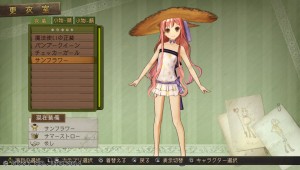
New to the game is the Album feature, which gives you another set of optional tasks to do. If you complete them, a piece of the picture will show up. Once the picture is completed, a special reward like additional bonus artwork, costumes and features will be unlocked. Thankfully, you only have to do them once to get these rewards.
As a whole, I’m enjoying Atelier Ayesha Plus quite a lot. While this game is more melancholic, probably a little more so than Escha and Logy (depending on what protagonist you choose), there are still a lot of cheerful slice of life moments. Hopefully the game will continue to be just as entertaining as I continue playing it.

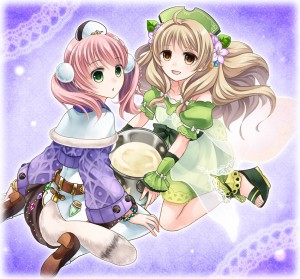

I had the PS3 copy myself and haven’t started it yet. It is kinda odd they decided to remove the Japanese voices in it. Will Atelier Escha & Logy feature Japanese voices?
Apparently, I think Tecmo-Koei had difficulties in getting the rights for the Japanese voices as they acquired Gust several years back and starting to handle the releases. While I don’t get the localized releases of Atelier anymore for the fact that I know a sufficient amount of Japanese to at least understand the story and in game text, I have mixed feelings with how they handled their localized releases. While it has gotten better for the fact that the localized release of Escha and Logy has dual audio, I heard that the translation was rather sloppy. Considering that I already have the Japanese version, I didn’t bother getting the English copy and probably will do the same for Atelier Shallie when I manage to get it. But at least it’s getting a bit better.